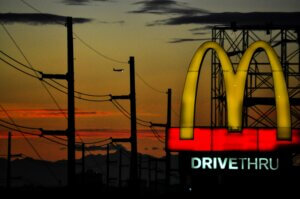
Although the bump in pay is intended to help improve the standard of living for more than half a million fast-food workers, there may be unintended consequences that could do more harm to these employees, including restaurant closures, job cuts, reduced hours and increased deployment of automation to bring down expenses.
Additionally, the costs for rising wages will be levied on consumers who will see higher prices for their once low-cost meals.
AB 1228
The new law, titled Assembly Bill 1228, was signed by Gov. Gavin Newsom in September, and requires that fast-food restaurants with 60 or more locations nationwide increase their workers’ pay to $20 an hour, which is $4 higher than the state’s minimum wage.
Secondly, it establishes a Fast Food Council, composed of industry representatives and restaurant workers, who are authorized to boost the wage annually by up to 3.5%, based on inflation. The council will also advise on health and safety standards for fast-food workers and combat issues like wage theft.
“Today’s action gives hard-working fast-food workers a stronger voice and seat at the table to set fair wages and critical health and safety standards across the industry,” Newsom said in a statement after he had signed the bill into law.
Potential Job Losses
To offset increased labor costs, business owners could quickly turn toward automation and robotics, thereby cutting down on the number of open jobs for this cohort.
In anticipation of the April 1 mandate, employers in California started slashing restaurant jobs and reducing hours, especially pizzerias, according to the Wall Street Journal.
Excalibur Pizza, a franchisee of Round Table Pizza, plans to eliminate 73 delivery jobs in April—21% of its workforce.
Additionally, two Pizza Hut operators in California announced cuts to more than 1,200 in-house delivery jobs in December, Business Insider reported after reviewing federal-employment notices filed with the state.
Automation
Franchise owners will be able to use technology to reduce the need for workers who engage in rote, routine tasks. The tech will enable restaurants to maintain productivity and efficiency with fewer employees.
Companies have already started to implement software to automate kitchen operations, including routing, timing of orders and dashboard reporting. Burrito chain Chipotle has been working with Vebu Labs, based in El Segundo, California, on a robot that aids in the preparation of avocados, called the Autocado. It is also testing a chip-making robot from Miso Robotics, according to a report by CNBC.
In 2021, Domino’s Pizza launched autonomous delivery in Houston, Texas, after a 2017 trial in Ann Arbor Michigan.
“There is still so much for our brand to learn about the autonomous delivery space,” said Dennis Maloney, Domino’s senior vice president and chief innovation officer at the time. “This program will allow us to better understand how customers respond to the deliveries, how they interact with the robot and how it affects store operations. The growing demand for great-tasting pizza creates the need for more deliveries, and we look forward to seeing how autonomous delivery can work along with Domino’s existing delivery experts to better support the customers’ needs.”
Robotics integrator RobotLAB launched a franchising program last year to help businesses implement robotics solutions into their operations.
Higher Costs For Food
In addition to stemming labor costs, fast-food chains will look toward raising their menu prices, impacting consumers’ wallets.
While corporate-owned McDonald’s stores are still considering solutions to neutralize more costly labor, franchisees in the Golden State have begun driving up their prices 5% to 7% in anticipation of the wage increases.
In a February earnings call, Chipotle CFO Jack Hartung told investors, “To cover the cost of the wage increase, we would need to take a mid-single-digit price increase in California.”
During recent earnings calls, Jack in the Box CEO Darin Harris revealed the company would look to price hikes between 6% to 8%, according to a Nasdaq report.
Nasdaq also reported that other businesses in California are expected to follow suit, with anticipated price increases of around 10%. If higher prices deter consumers from eating at these establishments that could lead to additional closures and job losses.
Source: Forbes


